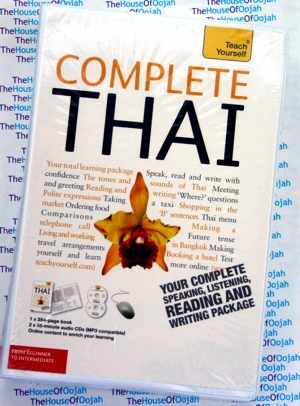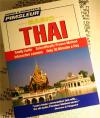Teach Yourself Complete Thai Language 2 Audio CD's and Book

Teach Yourself Complete ThaiBook and Double CDBy David Smyth More Thai Language Learning click here |
 |
Teach Yourself Thai Book and 2 Audio CDsNow fully updated to make your language learning experience fun and interactive. You can still rely on the benefits of a top language teacher and our years of teaching experience, but now with added learning features within the course and online.The course is structured in thematic units and the emphasis is placed on communication, so that you effortlessly progress from introducing yourself and dealing with everyday situations, to using the phone and talking about work. By the end of this course, you will be at Level B2 of the Common European Framework for Languages: Can interact with a degree of fluency and spontaneity that makes regular interaction with native speakers quite possible without strain for either party. Learn effortlessly with a new easy-to-read page design and interactive features: NOT GOT MUCH TIME? AUTHOR INSIGHTS GRAMMAR TIPS USEFUL VOCABULARY DIALOGUES PRONUNCIATION TEST YOURSELF EXTEND YOUR KNOWLEDGE TRY THIS Comprehensive - all you need to be able to communicate with confidence in all four skills: listening and speaking, reading and writing.
Completely updated - new edition with fully updated and improved material.
Thai script - the presentation of the script has been improved and extended to help you get to grips with reading and writing more quickly. Table of Contents: About the Author David SmythDavid Smyth, the author, spent several years teaching at universities in Thailand before taking up a post as Lecturer in Thai at the School of Oriental and African Studies at the University of London. About the Thai LanguageThai is the national and official language of Thailand and the mother tongue of the Thai people, Thailand's dominant ethnic group. Thai is a member of the Tai group of the Tai-Kadai language family. The Tai-Kadai languages are thought to have originated in what is now southern China, and some linguists have proposed links to the Austroasiatic, Austronesian, or Sino-Tibetan language families. It is a tonal and analytic language. The combination of tonality, a complex orthography, relational markers and a distinctive phonology can make Thai difficult to learn for those who do not already speak a related language. Standard Thai, also known as Central Thai or Siamese, is the official language of Thailand, spoken by about 65 million people including speakers of Bangkok Thai . Khorat Thai is spoken by about 400,000 (1984) in Nakhon Ratchasima; it occupies a linguistic position somewhere between Central Thai and Isan on a dialect continuum, and may be considered a variant or dialect of either. In addition to Standard Thai, Thailand is home to other related Tai languages, including: * Isan (Northeastern Thai), the language of the Isan region of Thailand, considered by some to be a dialect of the Lao language, which it very closely resembles (although it is written in the Thai alphabet). It is spoken by about 15 million people (1983). Many of these languages are spoken by larger numbers outside of Thailand. Most speakers of dialects and minority languages speak Central Thai as well, since it is the language used in schools and universities all across the kingdom. Numerous languages not related to Thai are spoken within Thailand by ethnic minority hill tribespeople. These languages include Hmong-Mien (Yao), Karen, Lisu, and others. Standard Thai is composed of several distinct registers, forms for different social contexts: * Street Thai : informal, without polite terms of address, as used between close relatives and friends. Many Thais can speak at only the first and second levels, though they will understand the others. |
Teach Yourself Complete Thai Book and 2 Audio CDs |

 0 Items (Empty)
0 Items (Empty)
